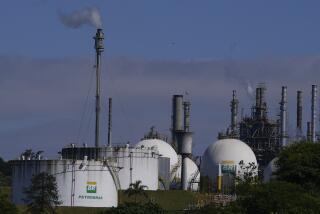5 Oil Nations Agree to Cut Output, Boosting Prices
- Share via
News that key oil-producing countries have agreed to cut crude production sent oil prices spurting to a five-month high Friday before slipping back slightly.
Saudi Arabia and four other nations ended an emergency meeting at The Hague with the announcement Friday that they intend to pump 2 million fewer barrels of oil a day, a move that is sure to boost oil and gasoline prices if the producers are able to keep their promises.
That would mean an end to the fuel holiday enjoyed for months by our hydrocarbon-addicted economy. Historically low oil and gasoline prices have kept inflation quiet and made U.S. consumers happy. Last year’s cheap energy prices knocked nearly a percentage point off the consumer price index, which fell just below 2% for all of 1998.
But the depressed prices have caused considerable pain for countries and corporations that make a living from oil and its products.
“Everyone has been decimated by this in the industry as well as in the oil-producing countries,” said Alan H. Struth, chief economist with Phillips Petroleum in Bartlesville, Okla. “The only ones who have benefited are motorists.”
“This definitely is a significant change in the market, if enacted,” Struth said. “Two million really is aggressive.”
However, these same countries--four of them members of the Organization of Petroleum Exporting Countries--vowed last year to reduce daily production by 3 million barrels and have had trouble toeing that line, achieving only 77% compliance last month, for example.
Oil futures prices surged on the announcement, touching a $15.11-a-barrel high not seen since October, but then fell back later in the day. The April contract for West Texas intermediate, the U.S. benchmark, settled at $14.49 a barrel, up 18 cents, on the New York Mercantile Exchange.
Gasoline prices have already been edging up, particularly in California. A Feb. 23 explosion at a Tosco Corp. oil refinery in Martinez in Northern California, which killed four workers, has added a nickel to the average price of gasoline in California.
The average price of unleaded self-serve gasoline for the week ended Monday was $1.162 a gallon in California and 96.3 cents a gallon nationwide. California’s cleaner-burning gasoline is more expensive to produce and is vulnerable to price swings because so few refineries make it.
A glut of oil caused when too much production crashed into falling demand has kept prices at rock-bottom levels for more than a year and forced Saudi Arabia, the world’s leading oil producer, to summon fellow OPEC members Iran, Algeria and Venezuela, together with nonmember Mexico, to two days of meetings in the Netherlands.
The resulting agreement to slash production by 2 million barrels a day must be formally approved at a March 23 meeting of OPEC in Vienna.
Despite the ambiguity surrounding the pact, “we know it is serious” because of Saudi Arabia’s key role, said Roger Diwan, director of global oil markets for Petroleum Finance Co., a Washington-based consulting firm.
“For such a policy shift, they needed a directive from the top, from the crown prince,” Diwan said. “The Saudis want the cuts to happen, and they have the means to bring the others to the table and make them agree.”
The goal is to purge an inventory buildup estimated at 150 million barrels. World oil production currently is about 75.25 million barrels a day, according to the International Energy Administration in Paris. Assuming full compliance, the two rounds of cuts would amount to roughly 6% of global daily output.
Oil analyst Sal Ilacqua had expected the price of West Texas intermediate to rise to about $16 a barrel in the second half of the year without production cuts. Friday’s agreement could boost that price to $18 or $20 a barrel, he said.
The price run-up, however, may be temporary, he said.
“The futures market has nothing to do with inventories and everything to do with psychology,” said Ilacqua of investment firm Rothschild Inc. in New York. “Psychology is what’s driving up prices now.”
(BEGIN TEXT OF INFOBOX / INFOGRAPHIC)
Oil Surge
Current contact price per barrel for West Texas inteermediate crude oil.
Friday: $14.49
* Source: Bloomberg News
More to Read
Sign up for Essential California
The most important California stories and recommendations in your inbox every morning.
You may occasionally receive promotional content from the Los Angeles Times.










